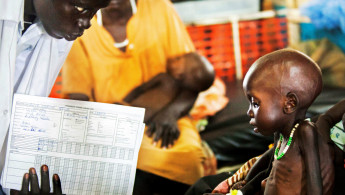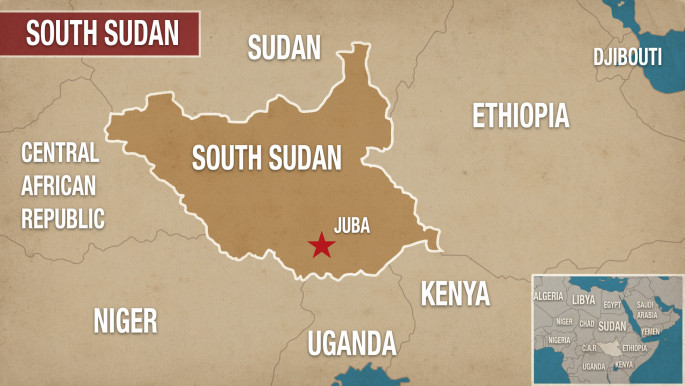South Sudan promises 'unimpeded' aid access amid famine
South Sudan's president has said his government will ensure "unimpeded access" for all aid organisations, a day after famine was declared for more than 100,000 people in the country suffering from years of civil war.
The United Nations and others have long accused the government of blocking or restricting aid delivery in the East African nation.
President Salva Kiir's remarks to the transitional national assembly came after the famine was declared in parts of oil-rich Unity state.
More than 100,000 people are affected, according to South Sudan's government and UN agencies. They say another one million people are on the brink of starvation.
"A formal famine declaration means people have already started dying of hunger. The situation is the worst hunger catastrophe since fighting erupted more than three years ago," said a statement by the World Food Programme (WFP), UN children's agency UNICEF and the Food and Agricultural Organisation (FAO).
According to aid groups, the number of people facing hunger is expected to rise to 5.5 million at the height of the lean season in July if nothing is done to curb the spread of the food crisis.
"Many families have exhausted every means they have to survive," said the FAO's representative in South Sudan, Serge Tissot.
"The people are predominantly farmers and war has disrupted agriculture. They've lost their livestock, even their farming tools. For months there has been a total reliance on whatever plants they can find and fish they can catch."
| Read also: Famine looms in Yemen, Nigeria, Somalia and South Sudan |
South Sudan has repeatedly promised to allow full humanitarian access across the country, but with little effect.
Some in Kiir's government have expressed hostility toward the international community, accusing it of meddling in the country's affairs.
Human Rights Watch researcher Jonathan Pedneault wrote on Tuesday that the famine is a man-made result of "conflict, warring parties blocking access for aid workers and large-scale human rights violations."
Also Tuesday, the European Commission announced an 82 million euro ($87 million) emergency aid package for South Sudan, saying this is the first famine declared in the country since it gained independence from Sudan in 2011.
"The humanitarian tragedy in South Sudan is entirely man-made," EU Humanitarian Aid and Crisis Management Commissioner Christos Stylianides said in a statement.
"Crucially what matters is that all parties allow humanitarian organisations to have immediate and full access to do their job and deliver aid."
Tens of thousands have died in the civil war that began in December 2013 and has continued despite a peace agreement in 2015. More than 1.5 million people have fled the country.
South Sudan also is experiencing severe inflation, which has made food unaffordable for many families.
The famine declaration also comes as millions across the Horn of Africa are going hungry due to a devastating drought following two failed rainy seasons.
The UN said Monday it is "scaling up assistance and protection" in Somalia, as about 6.2 million Somalis, or half the country's population, is in need of humanitarian assistance.
Nearly one million children will be acutely malnourished.
"The drought situation is deteriorating rapidly," said Peter de Clercq, the humanitarian coordinator for Somalia.
"Accelerated scale-up... assistance is required to avoid a dramatic rise in the number of malnourished children and a spike in mortality."
Famine last hit the region six years ago, killing an estimated 260,000 people in Somalia.
The drought has also affected food security in South Sudan, however the biggest contributor to the famine is the inability of aid agencies to reach areas where the economy has collapsed due to the war.






![The UAE is widely suspected of arming the RSF militia [Getty]](/sites/default/files/styles/image_330x185/public/2024-11/GettyImages-472529908.jpg?h=69f2b9d0&itok=Yauw3YTG)
![Netanyahu furiously denounced the ICC [Getty]](/sites/default/files/styles/image_330x185/public/2024-11/GettyImages-2169352575.jpg?h=199d8c1f&itok=-vRiruf5)
![Both Hamas and the Palestinian Authority welcomed the ICC arrest warrants [Getty]](/sites/default/files/styles/image_330x185/public/2024-11/GettyImages-2178351173.jpg?h=199d8c1f&itok=TV858iVg)